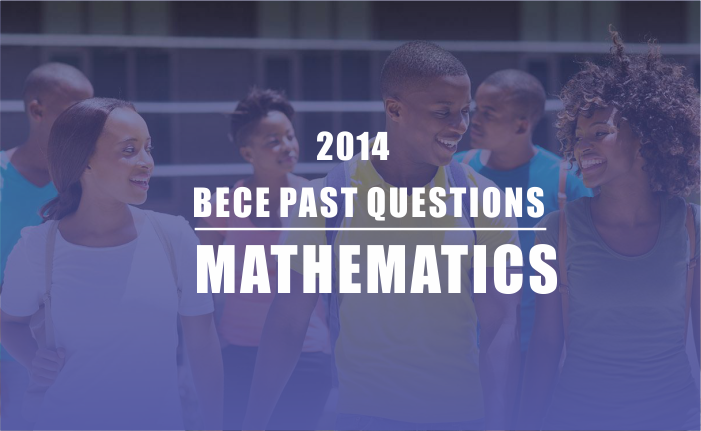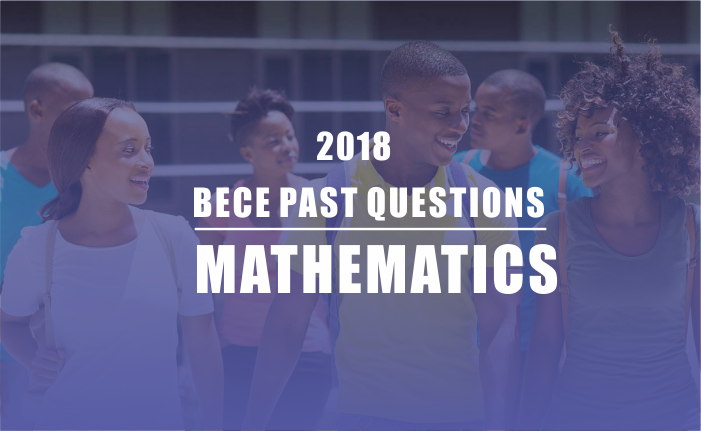Description
BECE 2014 Questions and Answers Mathematics
The Basic Education Certificate test (BECE) is an essential test that marks a critical milestone in the educational path of students in West Africa, notably those in nations such as Ghana and Nigeria. Students in these countries are expected to give the BECE. Students in Ghana and Nigeria deserve special attention because of the significance of this examination. As a result of gaining an understanding of the different kinds of questions that were included on the BECE in the year 2014, it is feasible to earn a substantial advantage.
Despite the fact that it is also considered to be among the subjects that are considered to be among the most vital, the BECE curriculum continues to offer mathematics as one of the courses that is considered to be among the subject matter that is considered to be among the most difficult. This post contains a breakdown of the BECE 2014 mathematics questions into their component portions. You can find this specific breakdown here. The purpose of this post is to provide students with solutions that are simple to comprehend as well as suggestions that will assist them in preparing for the future examinations that they will be taking.
Why the BECE 2014 Mathematics Questions Matter
If you have a great performance in mathematics, you may be able to have access to a wide variety of chances, not only in the academic world but also in the corporate sector. A good score in mathematics on the Basic Educational Competency Examination (BECE) can give students with opportunities to pursue their educational goals. The BECE is a crucial component in the process of choosing the educational courses that students will pursue. The types of mathematical themes and difficulties that are typically observed on the examination are reflected in the questions that were included on the BECE 2014 examination.

The examination will include questions similar to these. These inquiries are incorporated into the class material that is currently being presented. If the students are able to comprehend the format of these questions, they will be able to acquire an awareness of the areas in which they need to concentrate and develop strategies for dealing with challenges that are comparable to those that they have experienced in the past. Furthermore, they are able to construct techniques that will enable them to come up with answers to issues that are related to those that they have already been confronted with.
Overview of BECE Mathematics Syllabus
The BECE mathematics syllabus covers a broad range of topics designed to test students’ comprehension and analytical skills. The main areas in the 2014 syllabus included algebra, geometry, statistics, trigonometry, number operations, and set theory. Each of these topics comes with its own set of challenges and requires a thorough understanding to succeed. By reviewing questions and answers from 2014, students can get an idea of how these topics are tested and the depth of knowledge required.
Sample BECE 2014 Mathematics Questions and Answers
Here, we provide some sample questions from the BECE 2014 mathematics exam, followed by detailed answers and explanations. These samples are beneficial in understanding the pattern of questions, the level of difficulty, and the best approaches for solving them.
Question 1: Arithmetic Operations and Number Theory
A typical question from 2014 might have involved simple arithmetic operations or questions on number theory, such as finding the least common multiple (LCM) or the highest common factor (HCF) of a set of numbers. For example:
Example: Find the least common multiple of 6, 8, and 12.
Answer: To find the LCM, list the multiples of each number until you find the smallest common multiple. The multiples of 6 are 6, 12, 18, 24, etc., for 8 are 8, 16, 24, etc., and for 12 are 12, 24, etc. The smallest multiple common to all three numbers is 24, so the LCM is 24.
Question 2: Algebra and Equations
Algebra is a significant component of the BECE mathematics section. Students were asked to solve equations, simplify expressions, or factorize polynomials.
Example: Solve for x in the equation: 3x + 5 = 20.
Answer: To isolate x, subtract 5 from both sides, giving 3x = 15. Then, divide both sides by 3, resulting in x = 5. Therefore, x = 5 is the solution.
Question 3: Geometry and Mensuration
The BECE 2014 math exam also featured questions in geometry, which involved finding perimeters, areas, and volumes. This section tests students’ understanding of shapes, dimensions, and their applications.
Example: Find the area of a rectangle with a length of 10 cm and a width of 5 cm.
Answer: The area of a rectangle is calculated using the formula length × width. Thus, the area is 10 cm × 5 cm = 50 cm².

How to Effectively Study BECE 2014 Mathematics Questions
The 2014 questions are an excellent resource for practice, but effective studying goes beyond simply reviewing answers. Here are strategies that can enhance understanding:
- Analyze Each Question Carefully: Take the time to understand the requirements of each question fully. Look at how it’s structured, the topic it addresses, and the key concepts required to solve it.
- Practice Without Looking at the Answers First: Attempt to solve each question independently before referring to the answers. This method helps reinforce problem-solving skills and boosts confidence.
- Review Mistakes Thoroughly: When a mistake is made, go over it carefully to understand why it happened. This approach ensures that similar errors are not repeated.
- Understand the Mathematical Concepts: Instead of memorizing steps, focus on grasping the underlying concepts. For example, if you are working with geometry, understand why certain formulas work instead of simply memorizing them.
Importance of Answering BECE Past Questions
Answering past questions like those from BECE 2014 provides students with a realistic sense of exam timing, difficulty levels, and the types of questions they may encounter. Practicing these questions is also a proven way to reduce exam anxiety, as familiarity breeds confidence. By working through these questions under timed conditions, students can learn to manage their time more effectively, ensuring they complete all questions in the allotted exam time.

Final Tips for Students Preparing for BECE Mathematics
- Regular Practice: Mathematics requires consistent practice. Regularly solving problems improves calculation speed and accuracy.
- Master Basic Concepts: Foundational topics such as fractions, percentages, and basic geometry frequently appear in BECE exams, so mastering these can give students an advantage.
- Use Study Resources: Beyond past questions, students should use textbooks, online resources, and tutoring if possible, to reinforce their understanding of difficult topics.
- Stay Relaxed and Confident: A calm mind is crucial for performing well in mathematics. Developing confidence by solving many practice questions can help alleviate anxiety on the exam day.
Conclusion
Students who are interested in achieving a high score on the BECE should make use of the problems and answers that are provided for the BECE 2014 mathematics examination. Every student ought to make use of these resources because they are quite helpful and should be employed. Consequently, students are able to better prepare for the examination since they have a stronger understanding of the structure, style, and level of difficulty of the examination. This allows them to better prepare for the examination. During the course of their preparation for the BECE, students will be able to improve their mathematical skills, strengthen their confidence, and get better outcomes on the examination if they review these questions and implement a consistent study plan for the entirety of their preparation.





Reviews
There are no reviews yet.